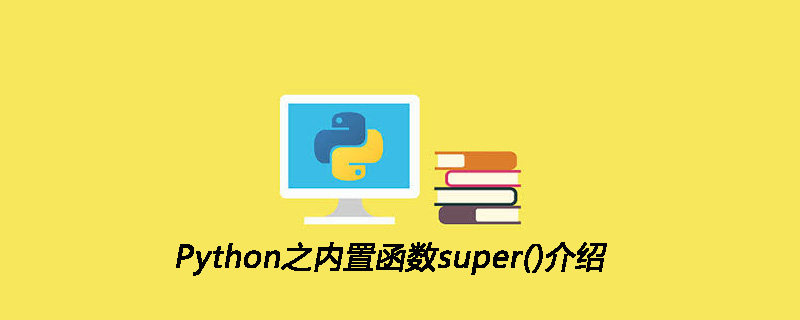Python之内置函数super()介绍

面向对象编程之super内置函数的用法
先来看一段代码:
定义一个名叫People的父类,又定义了一个叫Teacher的老师类和一个叫Student的学生类来继承People的类,并根据这两个子类实例化出两个对象s1和t1。
<pre class="brush:php;toolbar:false">class Date: def __init__(self,year,mon,day): self.year=year self.mon=mon self.day=day def birth_info(self): print("The birth is %s-%s-%s"%(self.year,self.mon,self.day)) class People: def __init__(self,name,age): self.name=name self.age=age def walk(self): print("%s is walking"%self.name) class Teacher(People): def __init__(self,name,age,year,mon,day,course): People.__init__(self,name,age) self.course=course self.birth=Date(year,mon,day) def teach(self): print("%s is teaching"%self.name) class Student(People): def __init__(self,name,age,year,mon,day,group): People.__init__(self,name,age) self.birth = Date(year, mon, day) self.group=group def study(self): print("%s is studying"%self.name) t1=Teacher("alex",28,1989,9,2,"python") s1=Student("jack",22,1995,2,8,"group2")</pre>现在问题来了,假如因为需要,我要修改老师类和学生类的父类People的名字。
这样一来,在老师类Teacher和学生类Student中继承的类People也要修改,以及它们调用的init方法的那个父类也要修改名字,太麻烦了有没有?这时候就可以使用super()这个内置函数来搞定了。
在python解释器中查看帮助信息:
<pre class="brush:php;toolbar:false">help(super)</pre>得到如下信息:
<pre class="brush:php;toolbar:false">Help on class super in module builtins: class super(object) | super() -> same as super(__class__, <first argument>) | super(type) -> unbound super object | super(type, obj) -> bound super object; requires isinstance(obj, type) | super(type, type2) -> bound super object; requires issubclass(type2, type)</pre>super是一个内置函数,加括号就得到一个对象,对象super()加"."可以直接调用父类的init方法。
这个对象在调用父类的init时,实际上就是在调用父类的绑定方法,所以就不需要在括号里加上self了。
相关推荐:《Python视频教程》
修改后的代码如下:
<pre class="brush:php;toolbar:false">class Date: def __init__(self,year,mon,day): self.year=year self.mon=mon self.day=day def birth_info(self): print("The birth is %s-%s-%s"%(self.year,self.mon,self.day)) class People: def __init__(self,name,age): self.name=name self.age=age def walk(self): print("%s is walking"%self.name) class Teacher(People): def __init__(self,name,age,year,mon,day,course): super().__init__(name,age) self.course=course self.birth=Date(year,mon,day) def teach(self): print("%s is teaching"%self.name) class Student(People): def __init__(self,name,age,year,mon,day,group): super().__init__(name,age) self.birth = Date(year, mon, day) self.group=group def study(self): print("%s is studying"%self.name) t1=Teacher("alex",28,1989,9,2,"python") s1=Student("jack",22,1995,2,8,"group2")</pre>这样一来,父类的名字改变了,代码里面继承的父类的init方法的名字也不需要修改了。
<pre class="brush:php;toolbar:false">python2中,也可以使用super,其调用方法为:super(Teacher,self)</pre>使用super()函数时,python会在mro列表中继续搜索下一个类。
只要每个重定义的方法统一使用super()并只调用它一次,那么控制流最终会遍历完整个mro列表。每个方法只会调用一次。
使用super调用的所有的属性,都是从mro列表当前的位置往后找,看mro列表的顺序就可以看到子类的继承关系。
查看上面代码中Teacher这个子类的mro列表可以使用这个方法:
<pre class="brush:php;toolbar:false">Teacher.mro()</pre>使用super可以避免使用多重继承时,子类继承父类的顺序问题。
子类继承父类的数据属性和函数属性时,先执行的先生效,当后面的代码与前面的代码有冲突时,
后面的代码会把前面的代码覆盖掉,不使用super时需要自己解决继承的顺序问题,使用super就可以很好的解决这个问题了。
您可能感兴趣的文章:
Python之内置函数super()介绍
Python中如何调用基类的成员方法
五分钟读懂Python中super().__init__和Base.__init__的区别
Python之类方法、__new__方法和__init__方法介绍
案例详解:Python类继承机制
Python中如何使用_new_实现单例模式
Java中super关键字用法介绍
python中实现多线程有几种方式?
java基础-java面向对象编程二
详解Python中的Thread线程模块
